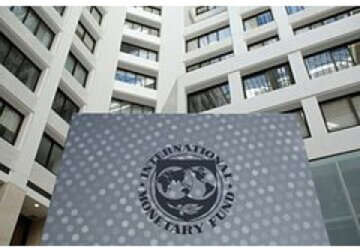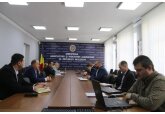
Reducing corruption in Moldova can speed up the approach to EU living standards - IMF experts.
This was stated by foundation experts Maxim Markevitch and Marina Marinkov in their analytical material “Corruption and economic growth in Moldova: a new look.” In this document, they examine the prevalence of corruption in Moldova, its impact on the country’s economic growth, and progress in implementing the recommendations of the 2021 IMF Governance Diagnostic on combating corruption and money laundering. IMF experts emphasized that Moldova, despite having a strong legal and institutional framework, faces serious problems of corruption that hinder its economic growth and approach to EU living standards. In the paper, they examined the complex relationship between corruption and economic growth and suggested that reducing corruption could accelerate Moldova's economic rapprochement with the EU. To determine the impact of corruption on economic growth, experts used regressions that control the determinants of growth and examined the impact of perceptions of corruption on future GDP growth. They relied on IMF methodology, focusing on panel data estimates over the past 20 years. Regression estimates confirmed the tendency of corruption to have a negative impact on economic growth. Experts suggest that a decrease in perceptions of corruption, represented by a 1-unit increase in the International Country Risk Guide (ICRG) Corruption Index, could boost per capita GDP growth by about 0.6%. Based on these findings, IMF experts modeled the projected change in Moldova's GDP per capita in proportion to EU GDP per capita under alternative levels of corruption. They indicated that if Moldova fails to reduce corruption, GDP per capita will remain at around 30% of the EU average in 2040. If corruption is reduced to the EU average (equivalent to an increase of 1 in the ICRG index, 3 points), then Moldova’s GDP will reach 35% of the EU average. However, if Moldova reduces corruption to the level of the most efficient, highest ICRG level in the EU (equivalent to a 3 point increase in the ICRG index), then GDP per capita will reach 45% of the EU average by 2040, with accelerated convergence in further. According to experts, the analysis shows the strengthening of the anti-corruption and anti-money laundering system in Moldova, but further progress is needed in both areas. The authorities have implemented a wide range of recommendations, but persistence in reform efforts in this area is critical and can help boost economic growth, promote competition and investment, and accelerate income convergence with the EU. It is emphasized that in order to reduce the significant risks of money laundering from illicit financial flows associated with corruption, further strengthening of the anti-money laundering (AML) regime is necessary. The ability of law enforcement agencies to use financial intelligence and conduct financial investigations should be strengthened to more effectively identify and trace the proceeds of corruption. Authorities should step up efforts to prosecute corruption-related money laundering, given the significant risks Moldova faces. IMF experts note that the National Bank of Moldova should develop tools for risk-based supervision of the financial sector and use risk-based targeted and thematic on-site inspections, targeting aspects that create increased risks in individual financial institutions, and focusing on their vulnerability to money laundering proceeds from corruption. Also, the fund’s experts believe that the NBM should introduce effective, proportionate and dissuasive sanctions for non-compliance with obligations to combat money laundering and the financing of terrorism, which may be hampered by the NBM’s cumbersome internal processes for approving sanctions. The authorities should provide the Public Services Agency (PSA) with the authority to impose sanctions for non-compliance with beneficial ownership requirements or create an effective mechanism for cooperation in this area between the PSA and the Ministry of Internal Affairs. As noted, increasing the investigative capacity of the Anti-Corruption Prosecutor's Office is a key priority of anti-corruption reforms in Moldova. After strengthening the mandate of the Anti-Corruption Prosecutor's Office to cover all high-ranking officials and crimes related to corruption, the authorities should immediately take measures to strengthen investigative capacity. In particular, the Anti-Corruption Prosecutor's Office must be provided with the necessary equipment, premises and personnel (prosecutors, investigators, lawyers and experts) to ensure sufficient capacity to carry out the mandate of investigating corruption at the highest level. The document sets out recommendations for increasing the investigative capacity of the Anti-Corruption Prosecutor's Office and creating a specialized judicial infrastructure to effectively combat corruption in Moldova. It is emphasized that in order to complete the institutional system to combat corruption, Moldova needs to create a specialized judicial infrastructure. Moldovan President Maia Sandu initiated the creation of an anti-corruption court to ensure the timely and specialized handling of corruption cases, introducing a bill to parliament in July 2023. The creation of an anti-corruption court has been identified as a key priority for justice reform due to delays in handling high-profile corruption cases and limited success in combating corruption in the justice sector with the current judicial system. Currently, the authorities are adjusting the bill taking into account the opinion of the Venice Commission, the adoption of the law is expected in early 2024. IMF experts believe that it is necessary to ensure several key aspects of the design of the anti-corruption court. The selection process for anti-corruption judges should be strengthened, for example by involving experts with international experience, drawing on lessons learned from the process of pre-screening members of the Superior Council of Magistracy. To ensure transparency of the process, it is necessary to establish objective and uniform selection criteria specific to judges involved in anti-corruption cases. To avoid overloading the new court, its jurisdiction should cover only cases investigated and/or prosecuted by the Anti-Corruption Prosecutor's Office, while ensuring a sufficient number of judges. Сomprehensive guarantees must be put in place to protect the staffing, budgetary and operational autonomy of the anti-corruption court. // 12.02.2024 — InfoMarket.







